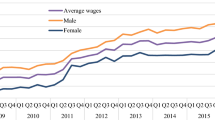Abstract
Using the 2004 National Sample Survey of Registered Nurses and the 2004–2005 American Community Surveys, we estimate the Black–White wage gap among females with at least some college education. We find that Black female nurses earn 9% more at the mean and median than White female nurses, controlling for selection into nursing employment. Among K-12 teachers, Black females earn 7% more than White females at the median. There is no Black–White wage gap among all women with a bachelor’s degree. Differences in opportunities for education and marriage between White and Black women may explain why highly educated Black females earn on par with highly educated White females.
Similar content being viewed by others
References
Alliance for Excellent Education: African American students and U.S. high schools. http://www.all4ed.org/files/archive/publications/AfAm_FactSheet.pdf (2008)
Anderson, D., Shapiro, D.: Racial differences in access to high-paying jobs and the wage gap between Black and White women. Ind. Labor Relat. Rev. 49(2), 273–286 (1996)
Auerbach, D.I., Buerhaus, P.I., Staiger, D.O.: Better late than never: workforce supply implications of later entry into nursing. Health Aff. 26, 178–185 (2007)
Beblo, M., Beninger, D., Heinze, A., Laisney, F.: Measuring selectivity-corrected gender wage gaps in the EU. ZEW Discussion Papers No. 03-74 (2003)
Becker, G.S., Chiswick, B.R.: The economics of education and the distribution of earnings. Am. Econ. Rev. 56, 358–369 (1966)
Black, D., Haviland, A., Sanders, S., Taylor, L.: Why do minority men earn less? A study of wage differentials among the highly educated. Rev. Econ. Stat. 88(1), 300–313 (2006)
Black, D., Haviland, A., Sanders, S., Taylor, L.: Gender wage disparities among the highly educated. J. Hum. Resour. 43(1), 630–659 (2008)
Black, S., Sufi, A.: Who goes to college? Differential enrollment by race and family background. National Bureau of Economic Research Working Paper No. 9310 (2002)
Blinder, A.S.: Wage discrimination: reduced form and structural estimates. J. Hum. Resour. 8(4), 436–455 (1973)
Bollinger, C.R.: Measurement error in human capital and the Black–White wage gap. Rev. Econ. Stat. 85, 578–585 (2003)
Caldwell Jr., R.: The Effects of University Affirmative Action Policies on Human Capital Development of Minority Children: Do Expectations Matter? Unpublished manuscript, Department of Economics, University of Kansas, Lawrence (2009)
Cameron, S.V., Heckman, J.J.: The dynamics of educational attainment for Black, Hispanic, and White males. J. Polit. Econ. 109, 455–499 (2001)
Carneiro, P., Heckman, J.J.: Human capital policy. National Bureau of Economic Research Working Paper No.9495 (2003)
Chiswick, B.R.: Differences in education and earnings across racial and ethnic groups: tastes, discrimination and investment in child quality. Q. J. Econ. 103, 571–597 (1988)
Gould, E.D., Daniele Paserman, M.: Waiting for Mr. Right: rising inequality and declining marriage rates. J. Urban Econ. 53, 257–281 (2003)
Gullickson, A.: Education and Black–White interracial marriage. Demography 43, 673–689 (2006)
Heckman, J.J.: Sample selection bias as a specification error. Econometrica 47, 153–161 (1979)
Houseworth, C.A.: Human Capital and Interracial Marriage in the United States. Unpublished Manuscript (2008)
Jacobsen, J., Olsen, C., King Rice, J., Sweetland, S., Ralph, J.: Educational attainment and Black–White inequality. Statistical Analysis Report, National Center for Education Statistics (2001)
Jacobson, J., Olsen, C., Rice, J.K., Sweetland, S., Ralph, J.: Educational achievement and Black–White inequality. National Center for Education Statistics Statistical Analysis Report NCES 2001-061 (2001)
Jones, C.B., Gates, M.: Gender-based wage differentials in a predominantly female profession: observations from nursing. Econ. Educ. Rev. 23(6), 615–631 (2004)
Lichter, D., LeClere, F., McLaughlin, D.: Local marriage markets and the marital behavior of Black and White women. Am. J. Sociol. 96(4), 843–867 (1991)
Linsenmeier, D.M., Rosen, H.S., Elena Rouse, C.: Financial aid packages and college enrollment decisions: an econometric case study. Working Paper No 9228, National Bureau of Economic Research (2002)
Neal, D.A.: The measured Black–White wage gap among women is too small. J. Polit. Econ. 112, 1–28 (2004)
Neal, D.A., Johnson, W.R.: The role of premarket factors in Black–White wage differences. J. Polit. Econ. 104, 869–895 (1996)
Oaxaca, R.: Male–female wage differentials in urban labor markets. International Economic Review 14, 693–709 (1973)
O’Neill, J., O’Neill, D.: What do Wage Differentials tell us about Labor Market Discrimination? NBER Working Paper 11240 (2005)
Orfield, G., Lee, C.: Why segregation matters: poverty and educational inequality. Harvard Civil Rights Project (2005)
Qian, Z.: Breaking the racial barriers: variations in interracial marriage between 1980 and 1990. Demography 34, 263–276 (1997)
Seitz, S.: Accounting for racial differences in marriage and employment. J. Labor Econ. 27(3), 385–437; 4(May): 263–276 (2009)
The Journal of Blacks in Higher Education: The Effect of Higher Education on Interracial Marriage. J. Blacks Higher Educ. 16, 55–56 (1997)
Urzua, S.: Racial labor market gaps the role of abilities and schooling choices. J. Hum. Resour. 43(4), 919–971 (2008)
Veneri, C.M.: Can occupational labor shortages be identified using available data? Mon. Labor Rev. (March) 122(3), 15–21 (1999)
Author information
Authors and Affiliations
Corresponding author
Additional information
This research was conducted while Jonathan Fisher was working with Litigation Analytics, Inc.
Electronic Supplementary Material
Below is the link to the electronic supplementary material.
Rights and permissions
About this article
Cite this article
Fisher, J.D., Houseworth, C.A. The reverse wage gap among educated White and Black women. J Econ Inequal 10, 449–470 (2012). https://doi.org/10.1007/s10888-011-9167-2
Received:
Accepted:
Published:
Issue Date:
DOI: https://doi.org/10.1007/s10888-011-9167-2




